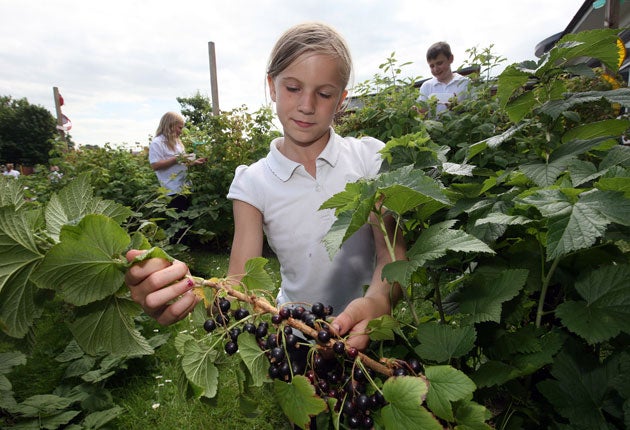School gardeners perform better in the classroom
Youngsters who get dug in are eating more fruit and vegetables, making them healthier and happier

Your support helps us to tell the story
From reproductive rights to climate change to Big Tech, The Independent is on the ground when the story is developing. Whether it's investigating the financials of Elon Musk's pro-Trump PAC or producing our latest documentary, 'The A Word', which shines a light on the American women fighting for reproductive rights, we know how important it is to parse out the facts from the messaging.
At such a critical moment in US history, we need reporters on the ground. Your donation allows us to keep sending journalists to speak to both sides of the story.
The Independent is trusted by Americans across the entire political spectrum. And unlike many other quality news outlets, we choose not to lock Americans out of our reporting and analysis with paywalls. We believe quality journalism should be available to everyone, paid for by those who can afford it.
Your support makes all the difference.Briony Coolledge is enthusiastic about maths these days. But ask her about her new-found fondness for the subject and she will enthuse about the fun she had planting and measuring the metre-squared raised seed beds in her school garden.
"I love sowing the seeds," the 10-year-old said. "I love watching them grow. I especially enjoyed planting the vegetables. I love working outside and it's great fun when you eat things such as raspberries and strawberries."
Briony is a pupil at Kingsway Primary School in Goole, Yorkshire, where the school garden has flourished as part of The Independent on Sunday's Let Children Grow campaign. The garden is "embedded into the curriculum", Liam Jackson, the school's headteacher said.
"Once we got them outside we found they were engaging more. Teaching English is key, and we have made a lot of use of the garden, especially with creative writing. We have had the children keeping a diary and writing about being lost in the garden," he said.
Anne-Marie Preston, 10, said: "Being outside is fantastic, much more fun than being in class. I love learning about the outdoors."
Finley Dance, 10, like most of the school's year five, agrees it is fun, but the educational value has not escaped him. He said: "I had heard people talk about sowing a seed, but I didn't know what it was until I did it myself."
A new study this week backs the IoS campaign, which aims to get all primary schools in the UK to provide some practical gardening for pupils.
Research by the Royal Horticultural Society (RHS), to be published tomorrow, reveals that school gardens boost children's development, teaching life skills and making children healthier and happier. The study of 1,300 school teachers and 10 schools taking part in the RHS's Campaign for School Gardening also highlights the ways school gardening increases the willingness of children to eat a wider range of vegetables and fruit.
"Work in the garden was frequently reported as an instrument to improve children's self-esteem, particularly for those who lacked confidence and self-belief", it reported. Simon Thornton-Wood, the RHS's director of science and learning, said: "[Gardening in schools] has transformed their whole learning environment."
Over the next three years, the RHS intends to train 4,500 teachers in how to integrate gardening into the curriculum. At present, only one in four primary teachers uses gardening to teach.
Television gardener and writer Alan Titchmarsh said: "From the minute my grandfather took me to his allotment, I was hooked. Watching how plants grew and getting my hands dirty brought fun and learning together. Gardening at school brings benefits every child should get the chance to enjoy."
Join our commenting forum
Join thought-provoking conversations, follow other Independent readers and see their replies
Comments